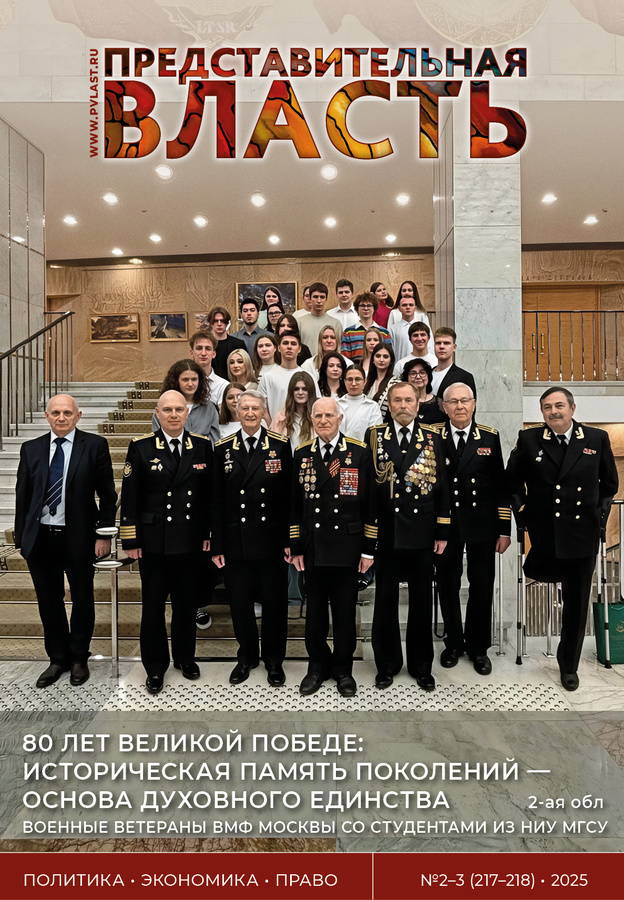Анализ использования в зарубежных странах отдельных антикоррупционных практик на основе цифровых технологий
- Авторы: Степанов А.О.1
-
Учреждения:
- Институт законодательства и сравнительного правоведения при Правительстве Российской Федерации
- Выпуск: № 1-2 (2024)
- Страницы: 46-49
- Раздел: Государство и право
- URL: https://journal-vniispk.ru/2073-9532/article/view/304252
- DOI: https://doi.org/10.54449/20739532_2024_1-2_46
- ID: 304252
Цитировать
Аннотация
В статье рассматривается проблема использования в зарубежных странах отдельных антикоррупционных практик, основывающихся на цифровых технологиях. Делается вывод о том, что такие технологии представляют собой мощный инструмент в борьбе с коррупцией, эффективное использование которого предполагает необходимость проведения дополнительных исследований с целью разработки соответствующих стратегий и политик, в т.ч. связанных с созданием соответствующей нормативно-правовой базы.
Ключевые слова
Об авторах
А. О. Степанов
Институт законодательства и сравнительного правоведения при Правительстве Российской Федерации
Автор, ответственный за переписку.
Email: stepanov.alexey99@gmail.com
аспирант отдела методологии противодействия коррупции Института законодательства и сравнительного правоведения при Правительстве Российской Федерации
Россия, МоскваСписок литературы
- Anderson, C.J., & Tverdova, Y.V. (2003). Corruption, Political Allegiances, and Attitudes Toward Government in Contemporary Democracies.
- Charron, N., Dijkstra, L., & Lapuente, V. (2015). Mapping the Regional Divide in Europe: A Measure for Assessing Quality of Government in 206 European Regions.
- Mauro, P. (1995). Corruption and Growth.
- Wei, S.J. (2000). How Taxing is Corruption on International Investors?
- Tanzi, V., & Davoodi, H. (1997). Corruption, Public Investment, and Growth.
- Van Deursen, A., & Van Dijk, J. (2010). Internet skills and the digital divide.
- Livingstone, S., & Helsper, E. (2007). Gradations in digital inclusion: children, young people and the digital divide.
- Hargittai, E. (2002). Second-level digital divide: Differences in people’s online skills.
- Fraillon, J., Ainley, J., Schulz, W., Friedman, T., & Gebhardt, E. (2013). Preparing for life in a digital age.
- Solove, D.J. (2006). A taxonomy of privacy.
- Culnan, M.J., & Armstrong, P.K. (1999). Information privacy concerns, procedural fairness, and impersonal trust: An empirical investigation.
- Cavoukian, A. (2009). Privacy by Design: The 7 Foundational Principles.
- Bertot, J.C., Jaeger, P.T., & Grimes, J.M. (2010). Using ICT to create a culture of transparency: E-government and social media as openness and anti-corruption tools for societies. Government information quarterly, 27(3), 264-271.
- Heeks, R., & Mathisen, H. (2011). Understanding success and failure of anti-corruption initiatives. Crime, law and social change, 58(5), 533-549.
- Kshetri, N. (2014). Big data's impact on privacy, security and consumer welfare. Telecommunications Policy, 38(11), 1134–1145.
- Atzori, M. (2015). Blockchain technology and decentralized governance: Is the state still necessary?
- Chui, M., Manyika, J., & Miremadi, M. (2016). Where machines could replace humans—and where they can’t (yet). McKinsey Quarterly.
- Brabham, D.C. (2008). Crowdsourcing as a model for problem solving. Convergence, 14(1), 75-90.
- Cecchini, A., & Scott, A. (2003). What's your fraud IQ? Journal of Accountancy, 196(2), 109.
- Hussmann, K. (2007). Anti-corruption policy making in practice: What can be learned for implementing Article 5 of UNCAC? U4 Issue, 2007(1).
- U.S. Department of Justice. (2019). Evaluation of Corporate Compliance Programs.
- Transparency International. (2018). Corruption Perceptions Index 2018.
- Manion, M. (2014). Corruption by Design: Building Clean Government in Mainland China and Hong Kong.
- Kim, S. (2017). The Politics of Anti-Corruption Reform in South Korea.
- Sundell, A. (2014). Are formal civil service examinations the most meritocratic way to recruit civil servants? Not in all countries.
- Mungiu-Pippidi, A. (2015). The quest for good governance: How societies develop control of corruption.
- Thai, K.V. (2001). Public Procurement Re-examined.
- Andrews, M. (2010). Good government means different things in different countries.
- Norris, P. (2014). Why electoral integrity matters.
- Bovens, M., Goodin, R.E., & Schillemans, T. (Eds.). (2014). The Oxford Handbook of Public Accountability.
Дополнительные файлы










